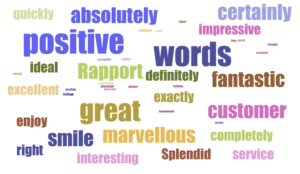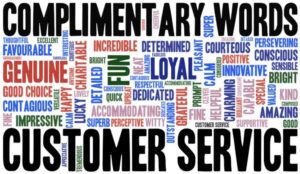In today’s competitive market, customer feedback is more valuable than ever, and understanding how customers express their dissatisfaction is key to improving service and products.
Certain words and phrases can reveal the depth of frustration, highlighting areas where businesses need to focus their efforts.
So we thought with speech analytics and emotion detection being in the spotlight, we would look at the key words and phrases that customers use to express their dissatisfaction.
Customer Statements Expressing Dissatisfaction
Combine the list below with the tone of the customer’s voice and you will be able to detect any disappointment or dissatisfaction:
Straight Talking
When customers are direct and clear in their dissatisfaction, their frustration often shines through. These statements leave little room for misinterpretation, emphasising a strong sense of dissatisfaction with the situation.
Examples of Straight Talking Phrases to Express Dissatisfaction
Customers who are direct and clear in their dissatisfaction, may use phrases like:
- ‘I’m not happy’
- ‘I’m very unhappy’
- ‘I cannot accept this’
- ‘I’m really angry/annoyed’
- ‘I’m confused’
- ‘I’m tired of..’
- ‘I want to make a complaint’
- ‘I want to speak to a manager/supervisor/team leader’
- ‘I want to talk to a real person’
Soft Language
Subtle but impactful, soft language expressions reflect a sense of disbelief or disappointment without directly confronting the service or product.
Customers using these words often feel let down, but they may still hold back from more aggressive condemnation.
Examples of Soft Language to Express Dissatisfaction
Customers expressing dissatisfaction through soft language may use words like:
- ‘Ridiculous’
- ‘Ludicrous’
- ‘Unbelievable’
Stronger Condemnation
Phrases that convey a high level of outrage, indicate deep dissatisfaction and a strong desire for the issue to be addressed immediately. These statements often reflect a complete loss of trust in the business.
Examples of Stronger Condemnation to Express Dissatisfaction
Customers expressing a high level of outrage and dissatisfaction using stronger condemnation may use phrases like:
- ‘Absolutely disgusting’
- ‘Disgraceful’
Expressions of Exasperation
Exasperated remarks are indicators of impatience and frustration, suggesting that the customer’s experience has reached a breaking point.
These expressions show that the customer is overwhelmed by the situation and expects swift resolution.
Examples of Expressions of Exasperation
If customers are exasperated they could say things like:
- ‘Oh my god’
- ‘You must be joking’
Repeat Callers
When customers refer to prior interactions, it signals that their issues have not been properly resolved and they are losing patience.
These repeated calls often carry a tone of frustration, as the customer feels the need to continually follow up to get what was promised.
Examples to Express Dissatisfaction About Repeat Calls
If a customer is referring to dissatisfaction about repeat calls, agents should keep an eye out for phrases such as:
- ‘This is the second/third time I’ve called’
- ‘That’s NOT what your colleague said’
- ‘I spoke to someone last week and they said they would call me back’
- ‘You guys promised me this…’
- ‘I thought you said..’
Expressions of Dissatisfaction Examples
We have put together twelve examples of what customers could say to express their dissatisfaction:
- “Hello, I am very dissatisfied with my recent order. The items were not as described, and I need to return them for a full refund.”
- “Hello, I am calling to express my frustration with an incorrect charge on my bill. I need this issue resolved immediately.”
- “I am disappointed with the level of service I received during my recent visit to your store. The staff were unhelpful, and I did not get the assistance I needed.”
- “I am very dissatisfied with the delivery service. My package arrived late and damaged. This is unacceptable, and I would like to know how this will be addressed.”
- “I am disappointed with the service I received. It did not meet the quality I was promised.”
- “I am really unhappy with the technical support I received. The issue is still unresolved, and I feel like my concerns were not taken seriously.”
- “I am writing to express my dissatisfaction with the product I received. It is not functioning as advertised, and I would like to request a refund or replacement.”
- “I had a disappointing experience recently. The wait time was excessively long, and the staff seemed untrained.”
- “I had a terrible experience with [Company Name]. The product arrived late and damaged, and customer service was unhelpful. Would not recommend.”
- “I’m not happy with the service I received today. I was ignored by the staff and couldn’t get any assistance with my purchase.”
- “Really unhappy with my experience at [company]. Not what I expected at all.”
- “The product I purchased is not working as advertised. I would like to request a refund or replacement.”
How Might an Agent Respond When a Customer Expresses Dissatisfaction?
When responding to a dissatisfied customer, it’s crucial for an agent to handle the situation with care and consideration, ensuring that their response not only acknowledges the issue but also provides a path toward resolution.
We have put together five effective actions an agent can take to address customer dissatisfaction:
1. Offer a Genuine Apology
A simple apology shows the customer that their dissatisfaction is recognised, but it should also reflect an understanding of their frustration.
Avoid generic apologies, like “I can only apologise”, as they can come across as insincere, as Nicolas and Billy explain :
“It is an awful expression and sounds very non committal. If something has gone wrong, then stating that you’re very sorry is the first thing that should be done and can be the most important thing that you do in the call.” – Nicolas
“It is one of the worst phrases you can use. It diminishes the agent to the role of message taker, never use it! If someone said it to me, my reply would be “Can you transfer me to someone who can do more than ‘only’ apologise?”.” – Billy
Instead, acknowledge the customer’s feelings more specifically, such as “I understand why this situation is frustrating for you.” Billy commented further on this:
For advice on offering a genuine apology, read our article: 21 Ways to Say “I’m Sorry” and Apologize to a Customer for Bad Service
2. Offer a Gesture of Goodwill
Depending on the situation, consider offering a gesture such as a discount, free service, or expedited solution. This can help rebuild trust and demonstrate that the customer’s business is valued.
Ensure the gesture matches the severity of the issue to feel appropriate and genuine.
If you are looking for inspiration of goodwill gestures you can offer to customers, read our article: Goodwill Gestures for Better Customer Relationships
3. Provide a Clear Path for Escalation
If the issue cannot be resolved immediately, offer to refer the customer to the complaints department or another team member who can better handle the issue.
Make sure the customer understands that their concern will be addressed by someone with the proper authority to resolve it, presenting the referral as a step toward resolution rather than a deflection.
4. Take Ownership of the Situation
Even if the problem cannot be resolved right away, take responsibility for the inconvenience and reassure the customer that you will do everything possible to help, as Steve explains:
“One of the things I’ve said is that I can’t change what’s happened in the past but I can make the experience better starting with this call, email, etc.
That puts a lot of responsibility on me to ensure that what I commit to gets done, but that’s the level of care that customers in that position deserve. Perhaps in the process something can be learned that will help change the business so it doesn’t happen to other customers.”
Let them know you are committed to finding a solution, even if it requires further action as Billy commented:
“Offering to refer to another department is also a potential minefield – does the caller need to know the internal workings of the organisation? Why not take responsibility for that call?
Take control – take ownership: the agent may have to speak to another department, but do that on behalf of the caller: not only are you saving them from explaining themselves again, you are the one going back to them with a solution, and will look much better in their eyes.”
For advice on how advisors can take control of customer contacts and provide outstanding customer service, read our article: Training Your Team to Take Ownership
5. Follow Up and Keep Promises
If you have promised to escalate the issue or provide a callback, ensure it happens. Following up is essential to customer satisfaction, and failing to do so can result in further frustration and potentially lost business.
Mike Parks suggested that using the APAC framework:
The APAC Framework
When handling complaints, it’s important to treat them like objection handling in sales calls by using the APAC framework (Acknowledge, Probe, Answer, and Commit). The steps are as follows:
- Acknowledge: Recognise the customer’s concern and show empathy towards their situation.
- Probe: Ask questions to fully understand the issue and get the bigger picture.
- Answer: Respond thoughtfully, focusing on providing a clear explanation or solution, rather than just apologising.
- Commit: Set clear expectations by offering realistic timescales and committing to resolve the issue.
By following these steps, agents can effectively manage complaints, turning a negative experience into a positive one.”
With thanks to the following people for sharing their thoughts and experience for this article:
- Jonathan Wax
- Adam Walton of Callminer
- Garry Williamson
Podcast – Dealing With Challenging Customers
Find out how to deal with challenging customers, who uses phrases like this, by listening to the following episode of The Contact Centre Podcast:
The Contact Centre Podcast – Episode 29:
Dealing With Challenging Customers
For more information on this podcast visit Podcast – Dealing With Challenging Customers
We have a number of other great articles on the words and statements to use in different customer service conversations:
- The Top 25 Positive Words and Phrases for Customer Service
- Negative VS Positive Words in Customer Service – With Examples
- 25 Affirmative Words and Statements to Support Customers
Author: Jonty Pearce
Reviewed by: Robyn Coppell
Published On: 10th Mar 2010 - Last modified: 11th Mar 2025
Read more about - Hints and Tips, Angry Customers, CallMiner, Emotion, Empathy, Jonathan Wax, Language, Nexidia, Speech Analytics, Training



















